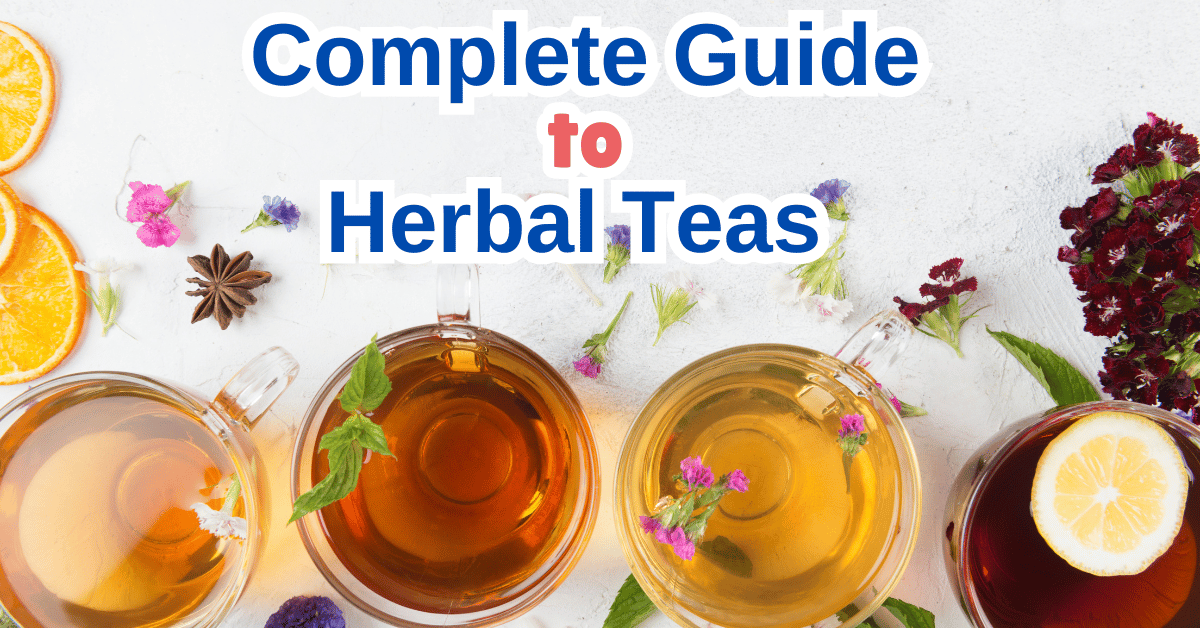Welcome to Kitchen Made Health! Herbal teas are a delightful way to support your health and well-being naturally. Each type of herbal tea offers unique benefits, and preparing them is simple and rewarding. In this guide, we’ll explore popular herbal teas, their health benefits, and how to prepare them.
1. Chamomile Tea

Benefits:
Promotes Relaxation and Sleep: Chamomile tea is well-known for its calming effects, making it an excellent choice for reducing stress and improving sleep quality.
Reduces Menstrual Pain: The anti-inflammatory properties of chamomile can help alleviate menstrual cramps.
Aids Digestion: Chamomile tea can help soothe the digestive tract, reducing symptoms of indigestion and bloating.
Anti-inflammatory: Chamomile contains compounds that reduce inflammation, potentially benefiting conditions like arthritis.
Preparation:
- Boil water and let it cool slightly (around 95°C or 200°F).
- Add 1-2 teaspoons of dried chamomile flowers to a teapot or infuser.
- Pour hot water over the flowers.
- Steep for 5-10 minutes.
- Strain and enjoy with optional honey.
2. Peppermint Tea

Benefits:
Peppermint tea helps relax the muscles of the digestive tract, reducing symptoms of bloating, gas, and indigestion.
Relieves Headaches and Migraines: The menthol in peppermint has a relaxing effect that can alleviate headache and migraine symptoms.
Freshens Breath: Peppermint has natural antibacterial properties that can help improve oral health.
Cold Relief: Peppermint tea can help relieve symptoms of colds, such as congestion and sore throat.
Preparation:
- Boil water and let cool slightly.
- Add 1-2 teaspoons of dried peppermint leaves.
- Pour hot water over the leaves.
- Steep for 5-10 minutes.
- Strain and enjoy. Add honey or lemon if desired.
3. Ginger Tea

Benefits:
Eases Nausea: Ginger is highly effective in reducing nausea, including morning sickness during pregnancy.
Reduces Muscle Pain and Soreness: The anti-inflammatory properties of ginger help reduce muscle pain and soreness.
Anti-inflammatory: Ginger contains powerful anti-inflammatory compounds, which can help with conditions like arthritis.
Supports Digestion: Ginger tea promotes digestive health and can relieve symptoms like bloating and gas.
Preparation:
- Slice 1-2 inches of fresh ginger root.
- Boil water and add the slices.
- Simmer for 10-15 minutes.
- Strain and enjoy. Add honey and lemon for flavor.
4. Rooibos Tea

Benefits:
Rich in Antioxidants: Rooibos tea is high in antioxidants, which help protect the body from oxidative stress and damage.
Supports Heart Health: Some studies suggest that rooibos tea can help improve heart health by reducing cholesterol levels.
Improves Skin Health: The anti-inflammatory and antimicrobial properties of rooibos may benefit skin conditions like acne and eczema.
Preparation:
- Boil water.
- Add 1-2 teaspoons of rooibos tea leaves.
- Pour boiling water over the leaves.
- Steep for 5-7 minutes.
- Strain and enjoy. Optional: Add milk and honey.
5. Lavender Tea

Benefits:
Promotes Relaxation: Lavender tea is known for its ability to reduce anxiety and stress, promoting a sense of calm.
Anti-inflammatory: Lavender has anti-inflammatory properties that can help reduce inflammation and pain.
Relieves Headaches: The calming effects of lavender can help alleviate headache symptoms.
Preparation:
- Boil water and let it cool slightly.
- Add 1-2 teaspoons of dried lavender flowers.
- Pour hot water over the flowers.
- Steep for 5-10 minutes.
- Strain and sweeten with honey if desired.
6. Hibiscus Tea

Benefits:
Lowers Blood Pressure: Hibiscus tea has been shown to help lower blood pressure in people with hypertension.
Rich in Antioxidants: High in antioxidants, hibiscus tea helps combat oxidative stress and may reduce the risk of chronic diseases.
Supports Liver Health: Some studies suggest hibiscus tea can improve liver health and function.
Aids Weight Loss: Hibiscus tea can help with weight management by reducing the absorption of starch and glucose.
Preparation:
- Boil water.
- Add 1-2 teaspoons of dried hibiscus petals.
- Pour boiling water over the petals.
- Steep for 5-10 minutes.
- Strain and enjoy. Add honey or lemon for a tart flavor.
7. Lemon Balm Tea

Benefits:
Reduces Stress and Anxiety: Lemon balm tea is known for its calming effects, helping to reduce stress and anxiety.
Supports Digestive Health: Lemon balm tea helps soothe the digestive system and can relieve symptoms of indigestion.
Antiviral Properties: Lemon balm has antiviral properties, which may help in fighting off viral infections.
Preparation:
- Boil water and let it cool slightly.
- Add 1-2 teaspoons of dried lemon balm leaves.
- Pour hot water over the leaves.
- Steep for 5-10 minutes.
- Strain and enjoy. Optionally add honey.
8. Rosemary Tea

Benefits:
Enhances Memory and Concentration: Rosemary is known to improve cognitive function, memory, and concentration.
Anti-inflammatory: Rosemary has compounds that reduce inflammation, benefiting conditions like arthritis.
Supports Digestion: Drinking rosemary tea can help stimulate the production of digestive enzymes, aiding in digestion.
Boosts Immune System: Rich in antioxidants and vitamin C, rosemary tea can help strengthen the immune system.
Improves Circulation: Rosemary tea helps improve blood circulation, ensuring the body receives ample oxygen and nutrients.
Respiratory Health: Rosemary tea can help alleviate respiratory issues like asthma and congestion, providing relief from sore throats and colds.
Preparation:
- Boil water.
- Add 1-2 teaspoons of dried rosemary leaves.
- Pour boiling water over the leaves.
- Steep for 5-10 minutes.
- Strain and enjoy with honey or lemon.
finally,
Herbal teas are a wonderful way to incorporate natural remedies into your daily routine. Each tea offers unique health benefits, and preparing them is easy and enjoyable. Experiment with different teas to find your favorites and enjoy the myriad of health benefits they provide.
Stay tuned to Kitchen Made Health for more natural remedies and health tips!
Also read this:
Are Low-Carb Diets the Long-Term Answer for Weight Loss?
Intermittent Fasting: Is It Safe for Everyone? Benefits, Risks, and How to Do It Right
The Effects of Cutting Out Sugar: What Happens Over Time (One Week, One Month, One Year)



